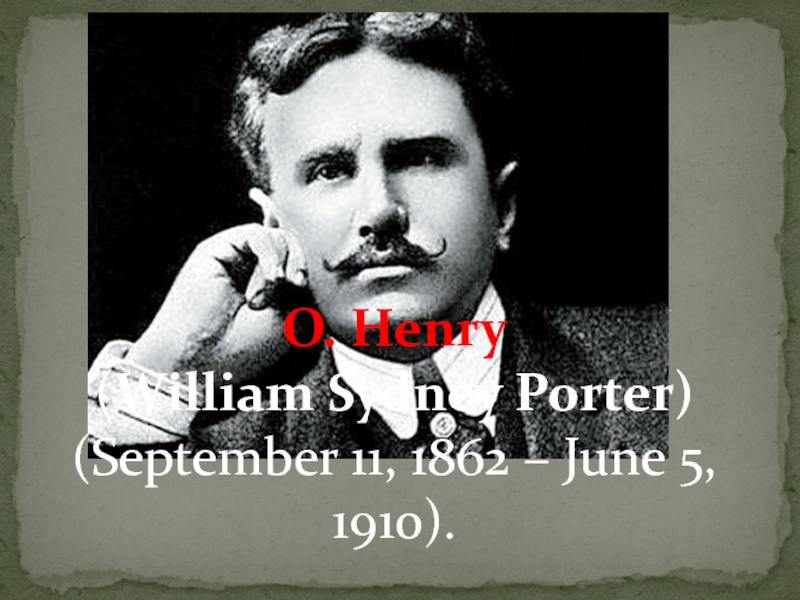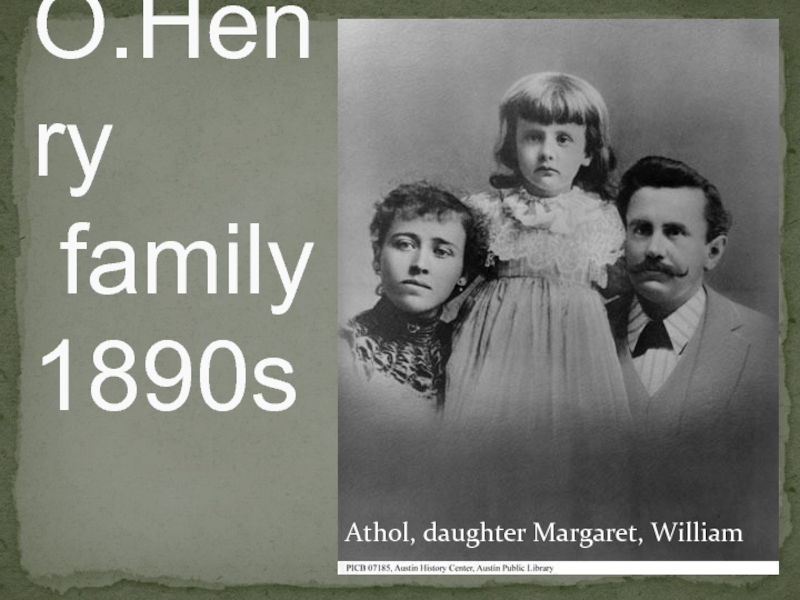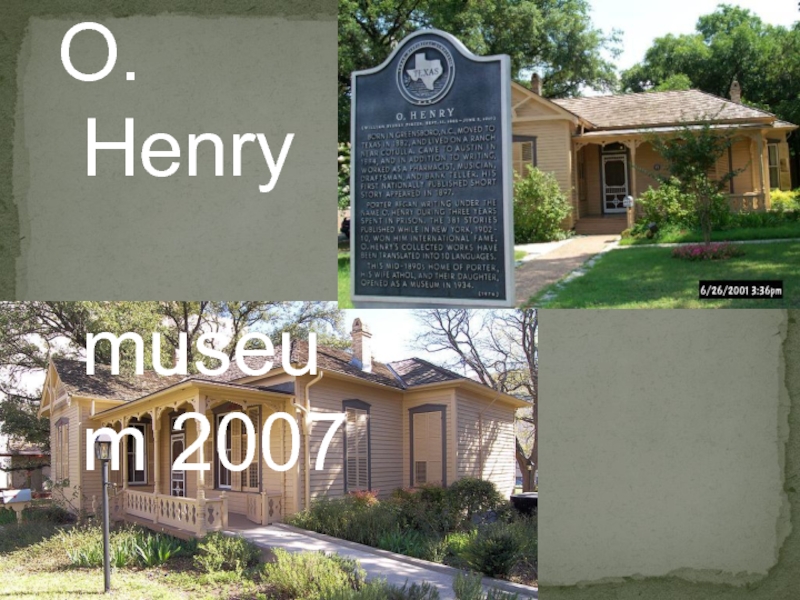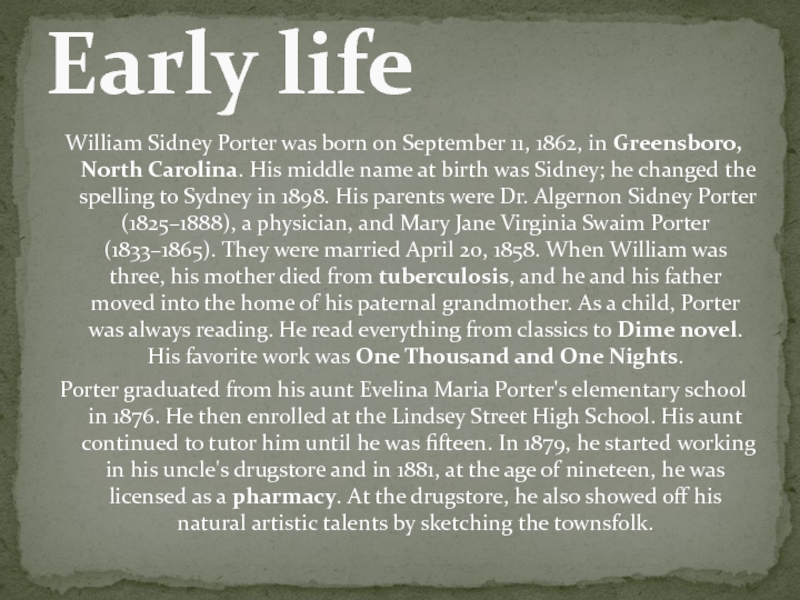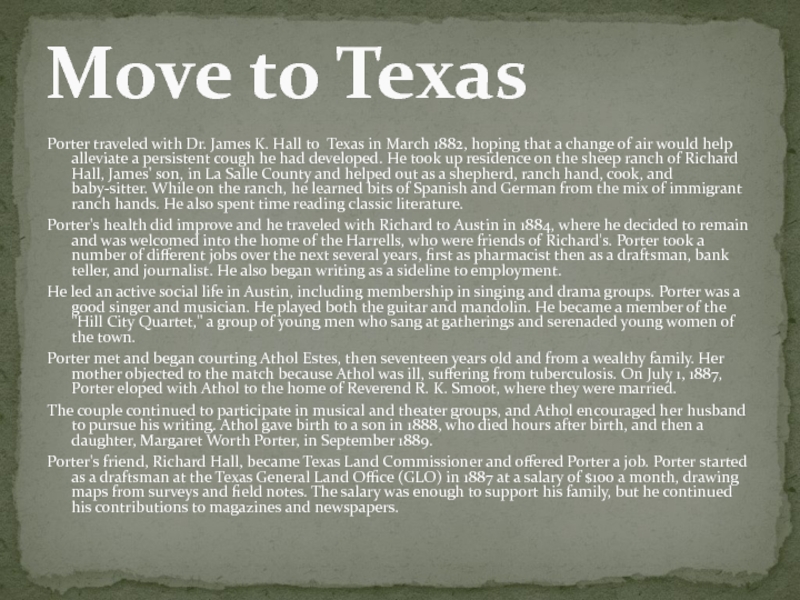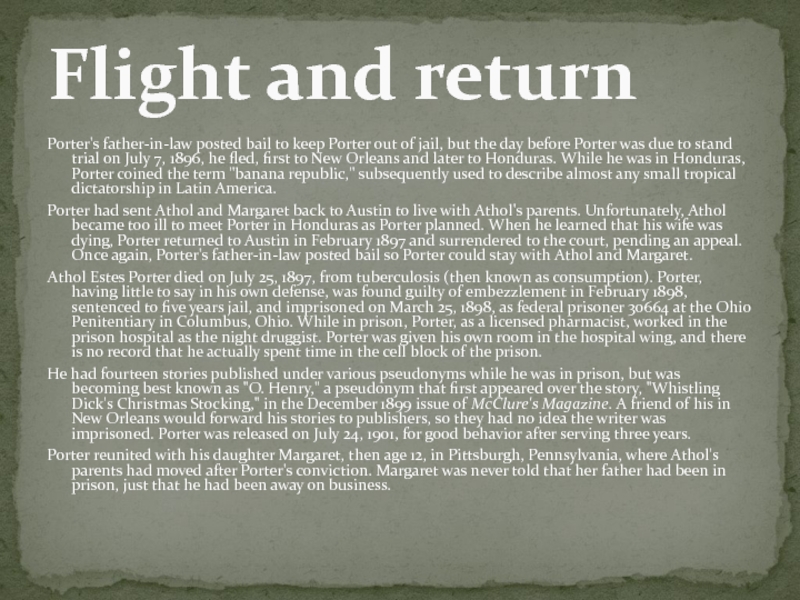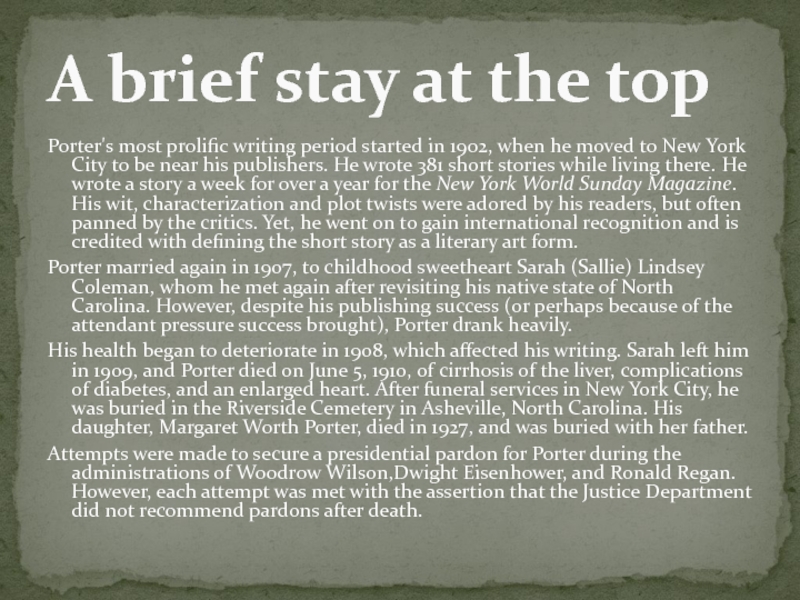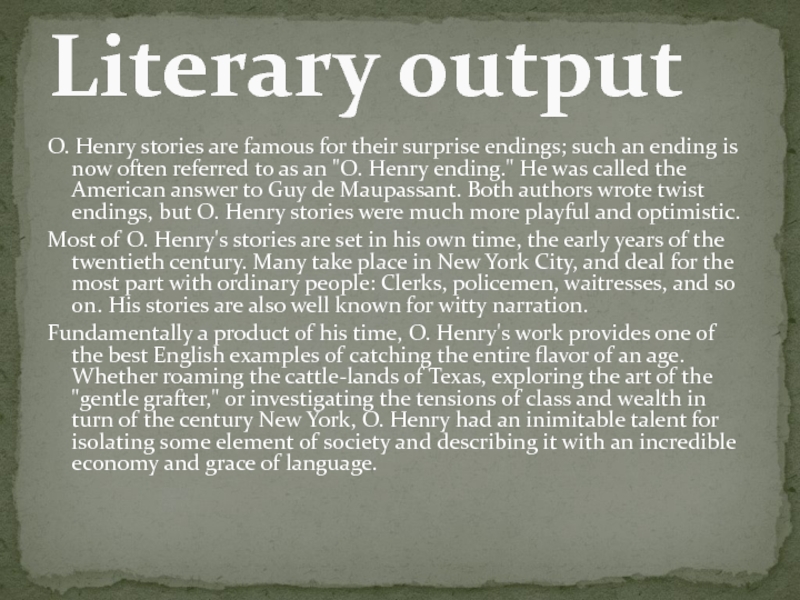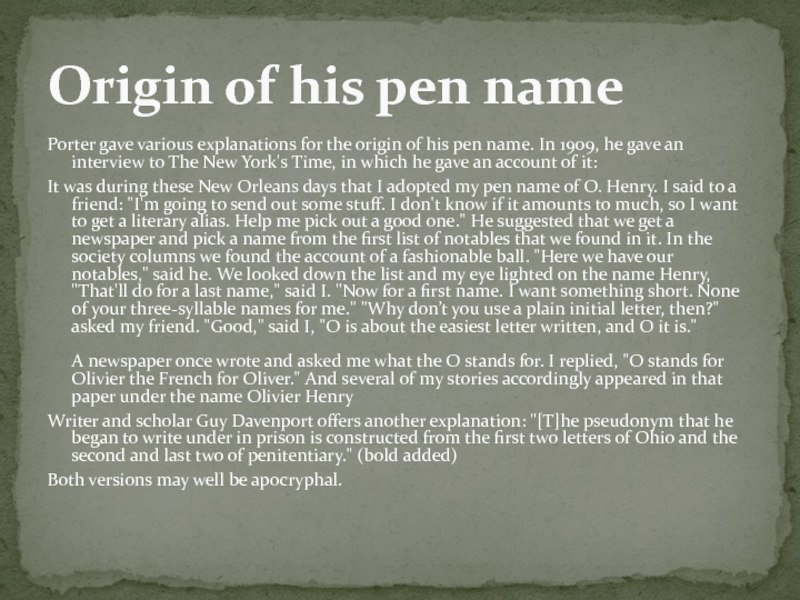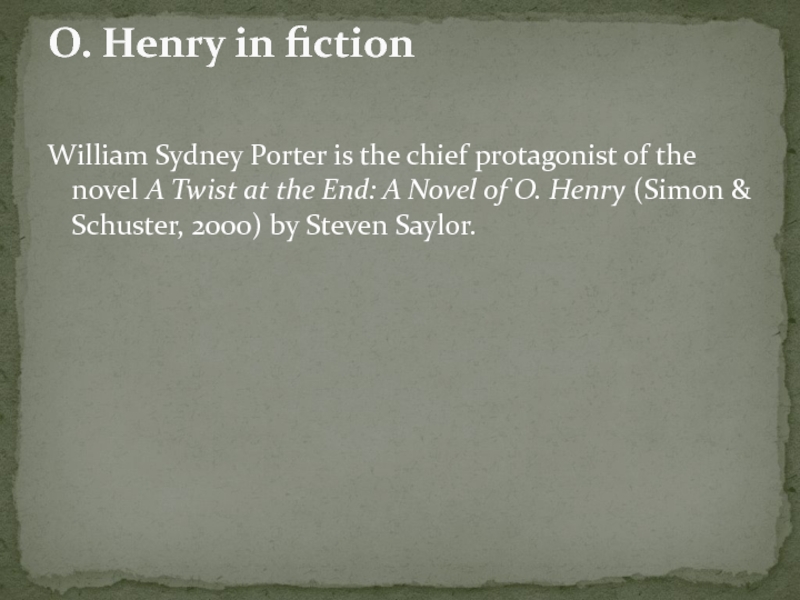Разделы презентаций
- Разное
- Английский язык
- Астрономия
- Алгебра
- Биология
- География
- Геометрия
- Детские презентации
- Информатика
- История
- Литература
- Математика
- Медицина
- Менеджмент
- Музыка
- МХК
- Немецкий язык
- ОБЖ
- Обществознание
- Окружающий мир
- Педагогика
- Русский язык
- Технология
- Физика
- Философия
- Химия
- Шаблоны, картинки для презентаций
- Экология
- Экономика
- Юриспруденция
O. Henry ( William Sydney Porter ) (September 11, 1862 – June 5, 1910)
Содержание
- 1. O. Henry ( William Sydney Porter ) (September 11, 1862 – June 5, 1910)
- 2. O.Henry family 1890sAthol, daughter Margaret, William
- 3. O. Henry museum 2007
- 4. William Sidney Porter was born on September
- 5. Porter traveled with Dr. James K. Hall
- 6. Porter's father-in-law posted bail to keep Porter
- 7. Porter's most prolific writing period started in
- 8. O. Henry stories are famous for their
- 9. Porter gave various explanations for the origin
- 10. William Sydney Porter is the chief protagonist
- 11. Скачать презентанцию
Слайды и текст этой презентации
Слайд 4William Sidney Porter was born on September 11, 1862, in
Greensboro, North Carolina. His middle name at birth was Sidney;
he changed the spelling to Sydney in 1898. His parents were Dr. Algernon Sidney Porter (1825–1888), a physician, and Mary Jane Virginia Swaim Porter (1833–1865). They were married April 20, 1858. When William was three, his mother died from tuberculosis, and he and his father moved into the home of his paternal grandmother. As a child, Porter was always reading. He read everything from classics to Dime novel. His favorite work was One Thousand and One Nights.Porter graduated from his aunt Evelina Maria Porter's elementary school in 1876. He then enrolled at the Lindsey Street High School. His aunt continued to tutor him until he was fifteen. In 1879, he started working in his uncle's drugstore and in 1881, at the age of nineteen, he was licensed as a pharmacy. At the drugstore, he also showed off his natural artistic talents by sketching the townsfolk.
Early life
Слайд 5Porter traveled with Dr. James K. Hall to Texas in
March 1882, hoping that a change of air would help
alleviate a persistent cough he had developed. He took up residence on the sheep ranch of Richard Hall, James' son, in La Salle County and helped out as a shepherd, ranch hand, cook, and baby-sitter. While on the ranch, he learned bits of Spanish and German from the mix of immigrant ranch hands. He also spent time reading classic literature.Porter's health did improve and he traveled with Richard to Austin in 1884, where he decided to remain and was welcomed into the home of the Harrells, who were friends of Richard's. Porter took a number of different jobs over the next several years, first as pharmacist then as a draftsman, bank teller, and journalist. He also began writing as a sideline to employment.
He led an active social life in Austin, including membership in singing and drama groups. Porter was a good singer and musician. He played both the guitar and mandolin. He became a member of the "Hill City Quartet," a group of young men who sang at gatherings and serenaded young women of the town.
Porter met and began courting Athol Estes, then seventeen years old and from a wealthy family. Her mother objected to the match because Athol was ill, suffering from tuberculosis. On July 1, 1887, Porter eloped with Athol to the home of Reverend R. K. Smoot, where they were married.
The couple continued to participate in musical and theater groups, and Athol encouraged her husband to pursue his writing. Athol gave birth to a son in 1888, who died hours after birth, and then a daughter, Margaret Worth Porter, in September 1889.
Porter's friend, Richard Hall, became Texas Land Commissioner and offered Porter a job. Porter started as a draftsman at the Texas General Land Office (GLO) in 1887 at a salary of $100 a month, drawing maps from surveys and field notes. The salary was enough to support his family, but he continued his contributions to magazines and newspapers.
Move to Texas
Слайд 6Porter's father-in-law posted bail to keep Porter out of jail,
but the day before Porter was due to stand trial
on July 7, 1896, he fled, first to New Orleans and later to Honduras. While he was in Honduras, Porter coined the term "banana republic," subsequently used to describe almost any small tropical dictatorship in Latin America.Porter had sent Athol and Margaret back to Austin to live with Athol's parents. Unfortunately, Athol became too ill to meet Porter in Honduras as Porter planned. When he learned that his wife was dying, Porter returned to Austin in February 1897 and surrendered to the court, pending an appeal. Once again, Porter's father-in-law posted bail so Porter could stay with Athol and Margaret.
Athol Estes Porter died on July 25, 1897, from tuberculosis (then known as consumption). Porter, having little to say in his own defense, was found guilty of embezzlement in February 1898, sentenced to five years jail, and imprisoned on March 25, 1898, as federal prisoner 30664 at the Ohio Penitentiary in Columbus, Ohio. While in prison, Porter, as a licensed pharmacist, worked in the prison hospital as the night druggist. Porter was given his own room in the hospital wing, and there is no record that he actually spent time in the cell block of the prison.
He had fourteen stories published under various pseudonyms while he was in prison, but was becoming best known as "O. Henry," a pseudonym that first appeared over the story, "Whistling Dick's Christmas Stocking," in the December 1899 issue of McClure's Magazine. A friend of his in New Orleans would forward his stories to publishers, so they had no idea the writer was imprisoned. Porter was released on July 24, 1901, for good behavior after serving three years.
Porter reunited with his daughter Margaret, then age 12, in Pittsburgh, Pennsylvania, where Athol's parents had moved after Porter's conviction. Margaret was never told that her father had been in prison, just that he had been away on business.
Flight and return
Слайд 7Porter's most prolific writing period started in 1902, when he
moved to New York City to be near his publishers.
He wrote 381 short stories while living there. He wrote a story a week for over a year for the New York World Sunday Magazine. His wit, characterization and plot twists were adored by his readers, but often panned by the critics. Yet, he went on to gain international recognition and is credited with defining the short story as a literary art form.Porter married again in 1907, to childhood sweetheart Sarah (Sallie) Lindsey Coleman, whom he met again after revisiting his native state of North Carolina. However, despite his publishing success (or perhaps because of the attendant pressure success brought), Porter drank heavily.
His health began to deteriorate in 1908, which affected his writing. Sarah left him in 1909, and Porter died on June 5, 1910, of cirrhosis of the liver, complications of diabetes, and an enlarged heart. After funeral services in New York City, he was buried in the Riverside Cemetery in Asheville, North Carolina. His daughter, Margaret Worth Porter, died in 1927, and was buried with her father.
Attempts were made to secure a presidential pardon for Porter during the administrations of Woodrow Wilson,Dwight Eisenhower, and Ronald Regan. However, each attempt was met with the assertion that the Justice Department did not recommend pardons after death.
A brief stay at the top
Слайд 8O. Henry stories are famous for their surprise endings; such
an ending is now often referred to as an "O.
Henry ending." He was called the American answer to Guy de Maupassant. Both authors wrote twist endings, but O. Henry stories were much more playful and optimistic.Most of O. Henry's stories are set in his own time, the early years of the twentieth century. Many take place in New York City, and deal for the most part with ordinary people: Clerks, policemen, waitresses, and so on. His stories are also well known for witty narration.
Fundamentally a product of his time, O. Henry's work provides one of the best English examples of catching the entire flavor of an age. Whether roaming the cattle-lands of Texas, exploring the art of the "gentle grafter," or investigating the tensions of class and wealth in turn of the century New York, O. Henry had an inimitable talent for isolating some element of society and describing it with an incredible economy and grace of language.
Literary output
Слайд 9Porter gave various explanations for the origin of his pen
name. In 1909, he gave an interview to The New
York's Time, in which he gave an account of it:It was during these New Orleans days that I adopted my pen name of O. Henry. I said to a friend: "I'm going to send out some stuff. I don't know if it amounts to much, so I want to get a literary alias. Help me pick out a good one." He suggested that we get a newspaper and pick a name from the first list of notables that we found in it. In the society columns we found the account of a fashionable ball. "Here we have our notables," said he. We looked down the list and my eye lighted on the name Henry, "That'll do for a last name," said I. "Now for a first name. I want something short. None of your three-syllable names for me." "Why don’t you use a plain initial letter, then?" asked my friend. "Good," said I, "O is about the easiest letter written, and O it is." A newspaper once wrote and asked me what the O stands for. I replied, "O stands for Olivier the French for Oliver." And several of my stories accordingly appeared in that paper under the name Olivier Henry
Writer and scholar Guy Davenport offers another explanation: "[T]he pseudonym that he began to write under in prison is constructed from the first two letters of Ohio and the second and last two of penitentiary." (bold added)
Both versions may well be apocryphal.
Origin of his pen name
Слайд 10William Sydney Porter is the chief protagonist of the novel
A Twist at the End: A Novel of O. Henry
(Simon & Schuster, 2000) by Steven Saylor.O. Henry in fiction
